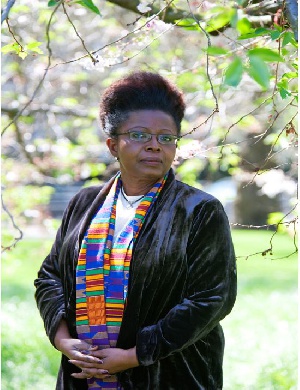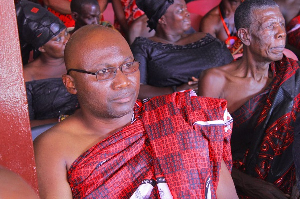- Home - News
- TWI News | TV
- Polls
- Year In Review
- News Archive
- Crime & Punishment
- Politics
- Regional
- Editorial
- Health
- Ghanaians Abroad
- Tabloid
- Africa
- Religion
- Election 2020
- Coronavirus
- News Videos | TV
- Photo Archives
- News Headlines
- Press Release
Opinions of Tuesday, 9 May 2017
Columnist: Francis Kwarteng
Efua Dorkenoo’s campaign against female genital mutilation, an unfinished business
A SPECIAL NOTE: In New York, this author sat in a class with a Guinean/Senegalese/Sierra Leonean young lady who vigorously and unabashedly defended female genital mutilation. She later confided in this author that she had one herself and will defend it until her last breath. She even said she will approve it for her daughters any day, any time. Obviously she was strongly in favor of the practice while this author opposed it unconditionally). Here we go:
MADAM EFUA DORKENOO, AN UNCOMPROMISING GENIUS BEHIND THE INTERNATIONAL CAMPAIGN AGAINST FEMALE GENITAL MUTILATION (FGM),
First, we dedicate two-part series (“Female Genital Mutilation in Ghana?”) to the late Madam Efua Dorkenoo, perhaps the fearless leading voice against female genital mutilation and an unwavering campaigner for women’s rights and gender equality. The Cape Coast-born Madam Dorkenoo founded the Foundation for Women’s Health, Research and Development (Forward) (website: forwarduk.org.uk), an activist organization whose institutional purpose The Guardian describes as follows:
“It aimed to safeguard the sexual and reproductive health and rights of African women and girls, with a focus on the abolition of FGM. Within two years of the organisation’s arrival, and with Efua’s work acting as a catalyst, FGM was made illegal in Britain, with the passing of the Prohibition of Female Circumcision Act in 1985.”
Second, we shall ask our readers to take a look at Madama Dorkenoo’s books “Cutting the Rose: Female Genital Mutilation: The Practice & Its Prevention” and “Female Genital Mutilation: Politics and Prevention.” Both books will surely educate those who have limited or no in-depth knowledge of the practice (Note: We’ve mentioned Madam Dorkenoo in some of our articles. For instance, in our 2013 article “Leave Tsatsu Tsikata Alone (11)” and our 2016 “The Gandhi Statue Removal Petition Has Nothing to Do With J.B. Danquah (1)”).
The first book made it to “Africa’s 100 Best Books of the 20th Century.” Readers should also note that we’ve already discussed “Africa’s 100 Best Books of the 20th Century” in some of our articles. (Note: A report “Female Genital Mutilation/Cutting: Data and Trends (Update 2017) appearing in Population Reference Bureau (PRB) declares: “In Cameroon, Ghana, and Tanzania, PREVELANCE IS MORE THAN TWICE AS HIGH IN RURAL AREAS (emphasis added).
However, a report by the Gender, Children and Social Protection Ministry in 2017 says:
“The practice is “around two percent, one quarter of what it was 30 years ago.” This means that it is not down to zero yet. The report states further: “there are strong regional differences…There are much higher prevalence rates in the Upper west and Upper East Regions…Though FGM is not allowed, some people still hide it and do it and many girls are still suffering it because they are not reported, nobody hears of them and action is not taken.”
The Gender, Children and Social Protection Ministry, however, is optimistic that it will virtually eliminate the practice by 2030! How, we don’t know! Why by 2030? How did they arrive at a ballpark estimate of 2%? What does this amount to in terms of regional breakdown? What is the margin of error, if any?
Which statistical methods were used, who collected the data and how was the data collected? Which age group(s) was involved in this study? What is the sample size, and how was this determined?
Unfortunately before we submitted this article for publication we visited the website of the Gender, Children and Social Protection Ministry on a number of occasions, lest no discerning reader should come after us questioning the validity of our statistical claims, for an original copy of the said report but found nothing.
Therefore we shall call upon the Gender, Children and Social Protection Ministry to make the report and data available to the public for a constructive, discursive examination and balanced criticism. After all, basic though important documents such as this report should be accessible to the public.
Well, let’s not make Madam Dorkenoo’s memorable activism, work, and tireless efforts go to waste. In that regard, we can memorialize her legacy and we must honor her by bringing this shameful chapter in our national life to an absolute end. She deserves a place in the pantheon of Ghanaian and African heroines and heroes.
Then, finally, influential women leaders such as Madam Rebecca Akufo-Addo, the current president’s wife and Madam Otiko Afisa Djaba, Minister for Gender, Children, and Social Protection, should closely read Madam Dorkenoo’s written works and also study her lifetime work of activism well, that is intimately without political blinders on, if they have not in fact done this already, for teachable insights into what humanism, self-sacrifice, social justice, gender inequality are all about, as well as into the complicated issues of maternal/infant mortality and morbidity, sexism, rape, workplace discrimination against women in particular, and all forms of violence against women in general.
Simply, Madam Dorkenoo deserves a national monument in her honor in Ghana and at the headquarters of the African Union. Is that asking too much? Absolutely not! At this point we will dedicated Rachel Patten’s to Madam Dorkenoo’s memory:
“Like a small boat on the ocean
“Sending big waves into motion
“Like how a single word can make a heart open
“I might only have one match
“But I can make an explosion
“And all those things I didn't say
“Wrecking balls inside my brain
“I will scream them loud tonight
“Can you hear my voice this time?
And yes, even as Madam Dorkenoo is screaming loud tonight against the shameful practices of female genital mutilation and gender inequality and trokosi and child marriage, can we still hear her roaring moral voice from the great beyond? With that said, here is more about her:
“Efua Dorkenoo, who has died aged 65 after undergoing treatment for cancer, was a tireless campaigner against female genital mutilation. She was widely regarded as the mother of the worldwide movement to end FGM. Efua fought for more than 30 years to ensure the protection of girls and women from a practice that violates their human rights.
“She was born in Cape Coast, Ghana, daughter of John and Marian Elliot-Yorke. One of 11 children, she grew up on the campus of Adisadel college, Cape Coast, where her father was the school nurse, and went on to attend Wesley girls’ high school, where she eventually became a house prefect. At the age of 17, Efua moved to London, where she became a staff nurse at various hospitals including the Royal Free.
“She was first exposed to FGM in the 1970s when she witnessed the agonies of a woman who had undergone infibulation, as she struggled to give birth. To Efua, FGM was the most inhumane practice she had ever seen, and the failure of doctors to help women who had undergone it, or even to acknowledge it, made them complicit in the suffering.
“She began campaigning against the practice in the early 80s, while working for the charity Minority Rights Group. She went on to research FGM at the London School of Hygiene and Tropical Medicine and gained a master’s degree in 1982.
“Under the auspices of the MRG, Efua published the first report on the subject in Britain. This helped her secure the necessary funds to set up the Foundation for Women’s Health, Research and Development (Forward), in 1983. It aimed to safeguard the sexual and reproductive health and rights of African women and girls, with a focus on the abolition of FGM. Within two years of the organisation’s arrival, and with Efua’s work acting as a catalyst, FGM was made illegal in Britain, with the passing of the Prohibition of Female Circumcision Act in 1985.
“Her struggle was not without personal consequences. By taking on an age-old custom, she often provoked the wrath of traditionalists. Efua’s determination to end FGM, however, did not allow her to slow down. She often remarked that “there is no time to rest while children are being abused”.
“For her work with Forward, Efua was appointed OBE in 1994. That was also the year in which her Cutting the Rose: Female Genital Mutilation: The Practice and Its Prevention was published. It was the first time any publication had explored FGM in such depth and the book is still considered an essential read. In 2002, it was selected by an international jury as one of Africa’s 100 best books of the 20th century.
“Efua’s expertise in the field was sought by the World Health Organisation, where from 1995 until 2001 she was acting director of the department of women’s health. In that capacity, she coordinated regional action plans against FGM in six African countries (Burkina Faso, Ghana, Cameroon, Kenya, Somalia and Sudan), helping to move the issue of FGM on to the agenda of ministries of health.
“Throughout her work at the WHO, Efua struggled to ensure all member states banned FGM. Efua felt that misguided cultural sensitivities were delaying progress in its abolition, and so she promoted the framing of the practice as a human rights violation. At the WHO she succeeded, but the United Nations did not follow suit until 2012.
“Efua grew impatient with the pace of progress, knowing that each year millions of girls around the world were subjected to the practice. She left the WHO for Equality Now, a pioneering women’s rights organisation that in 2000 awarded her a joint lifetime achievement award with Gloria Steinem for their contributions to international human rights.
“There, as the advocacy director of their global programme on FGM, Efua made sure that the voices of survivors were brought to the fore. She knew that no argument about cultural sensitivity would hold against the stories and determination of women who had undergone such terrible ordeals. She made sure that survivors came with her to every policy meeting and consultation event, and this, combined with strategic media advocacy work, resulted in a rapid build-up of political will.
“In 2013, the British government announced funding to help end FGM in Africa and beyond within a generation. Efua became the programme director of what would become The Girl Generation: Together to End FGM, linking up the various organisations working to end the practice. The programme was launched a week before her death.
“In 2012 Efua was made honorary senior research fellow in the School of Health Sciences at City University, London. In 2013, she was named one of BBC’s 100 Women.
“She is survived by her husband, Freddie Green, by two sons, Kobina and Ebow, two stepsons, Galvin and Yanik, and a stepdaughter, Fummi, and by her grandson, Cassius.
“Efua Dorkenoo, campaigner, born 6 September 1949; died 18 October 2014.”
References
Population Reference Bureau (PRB) (2017). Female Genital Mutilation/Cutting: Data and Trends (Update 2017). Retrieved from http://www.prb.org/pdf17/FGMC%20Poster%202017.pdf
Leyla Hussein. (2014, October 22). Efua Dorkenoo Obituary. Retrieved from https://www.theguardian.com/society/2014/oct/22/efua-dorkenoo
Josephine Nyarkoh. “Ghana Receives International Applause For Reducing FGM Practice.” Ghana News Agency. January 30, 2017.











